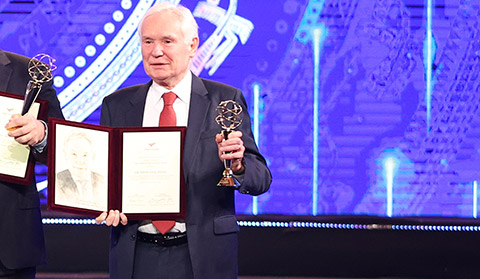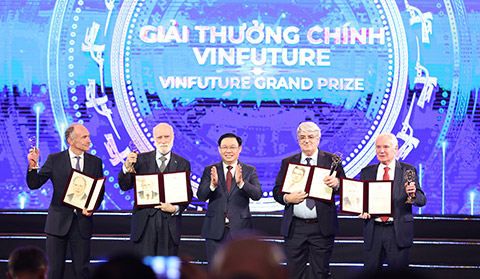Southampton scientist receives prestigious global award

A scientist at the University of Southampton, whose pioneering work made possible the internet as we know it today, has been awarded a major international prize in Vietnam.
Sir David Payne is a professor of photonics and director of the Optoelectronics Research Centre at the University and for over 50 years has been recognised globally for his research in developing optical fibre technology.
A multi award winning scientist, Sir David has received his latest accolade in Hanoi, Vietnam: the VinFuture Foundation Grand Prize for his breakthrough in what’s known as the erbium-doped fibre amplifier (EDFA), which made possible the internet optical backbone.
Under the theme 'Reviving and Reshaping', the prestigious VinFuture Prize 2022, which is in its second year, aims to find and celebrate outstanding science and technology achievements that create positive changes following the pandemic. Its aim is also to help foster sustainable development for millions of people around the world. Each of this year’s five winners, who include Sir Tim Berners-Lee, who invented the World Wide Web software and wrote the first web browser; Dr Vinton Gray Cerf and Dr Robert Elliot Kahn who invented the Transmission Control Protocol and Internet Protocol (TCP/IP); and Dr Emmanuel Desurvire, who contributed to the EDFA development, will share a prize of $3m in recognition of their contributions to quality of life.

Thirty-five years ago, Sir David and his team at Southampton made one of the most significant developments in modern telecommunications. It was a discovery that was set to transform the Internet and become the backbone of the internet as we know it today.
Now, 35 years later his development of the erbium doped fibre amplifier (EDFA) – the world’s first successful optical amplifier, which employs the rare earth ion erbium to boost the intensity of the signals as they spread through the billion-km world wide web of optical fibres - still plays a pivotal role in our global communications.
One of the most highly recognised scientists in the UK, Sir David remains at the heart of this pioneering work. He has received numerous awards and international recognition over his prestigious 50+ - year career. As well as his knighthood, he has also received the Marconi Society Prize and Fellowship for his pioneering work in fibre optoelectronics and fibre telecommunications.
Upon receiving the prize from VinFuture, Sir David, said:: “VinFuture 2022 is a great prize. Beyond the goal of honoring science–technology inventions, the prize also serves as a bridge connecting the brilliant minds of scientists, contributing to collaboration on breakthrough ideas and helping to change the lives of millions of people across the world. To me, the greatest accolade is recognition by my peers, by other scientists. To be on the same platform with Tim Berners-Lee, Vinton Cerf, and other prize winners is absolutely incredible for me. As I'm approaching the end of my career, I can now look back and say, I did something that changed the world. That is important to me.”
The Optoelectronics Research Centre at the University of Southampton is one of the largest and most prominent research institutes in the world. Its staff have received many awards for their work, but the VinFutures Grand Prize is perhaps the most prestigious. Ranked 12th in the UK and in the top 100 globally, the University of Southampton is a world-class institution with campuses in Southampton, Winchester and Malaysia. This year it celebrated the 70th anniversary of being the first University to have been granted the Royal Charter by Her Majesty Queen Elizabeth II.
Recognised throughout the world for its research, enterprise and knowledge exchange these disciplines alone contribute just over £2bn to the country’s economy.